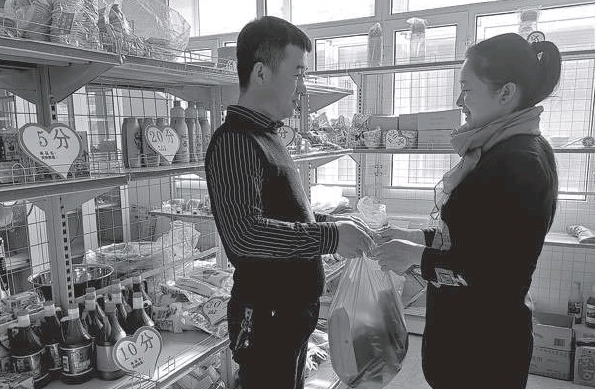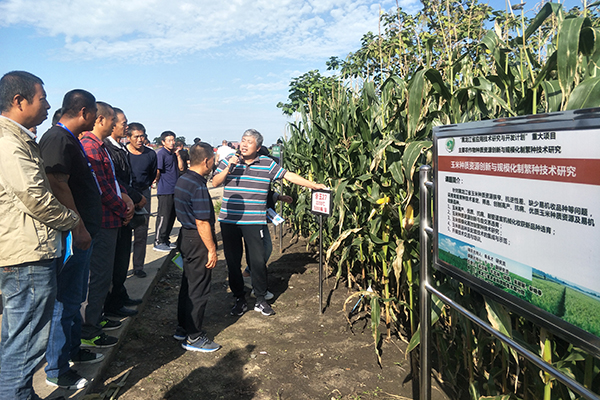
For Su Zhonghua, the most relaxing time of day is writing poetry at night after a whole day's work.
His poems, mainly focusing on the poverty alleviation policies and rapid changes of life, are quite famous among locals in Huachuan county, Heilongjiang province. Some of the poems have been put to music and sung all over the country.
However, the 58-year-old Zhujia villager never thought he would be able to resume his literary work even three years ago.
Su had been an industrious young planter who made a good living for his family in the 1980s. He was famous in his village for being hardworking, but everything changed when his second child was diagnosed with severe cerebral palsy at the age of 5 in 1990.
Today’s story in the story looks at the example set by Su of how his family shook off poverty and how he was able to get back to his poetry.

A villager(right) receives free goods from village chief of Liu Ziyu at a benevolence supermarket in Zhujia village in Huachuan, Heilongjiang province. (Photo: China Daily)
Over the next six years, the family spent about 120,000 yuan ($17,200) for what amounted to ineffective treatment. "Most of the money was borrowed," Su said. "I finally gave up due to the heavy burden and hopelessness."
To pay the debts, Su worked odd jobs at factories and construction sites, but the situation did not change much.
At the end of 2013, Su's family was registered as poverty-stricken by the local government.
Under proposals suggested by government officials, Su expanded his cultivation and chose to grow some commercial crops, such as Chinese herbal medicine. The officials also helped Su's daughter get medical insurance and government subsidies, helping reduce the family's burden.
During the slack season, Su worked in sanitation and did some gardening in the county. By the end of 2016, the family finally paid off their debts and escaped poverty.
In 2019, the family's income reached 48,000 yuan, nearly five times as much as in 2013. Su became more energetic in labor and often publicizes the Party's poverty alleviation policy to the villagers.

Anti-poverty activities taken place in the county. (Photo:Agency)
Now, after more than two decades of struggle, Su feels relaxed for the first time and has resumed his literary pursuits.
Su's case in Zhujia village is just one of many examples of the effectiveness of the nation's anti-poverty campaign in Huachuan county. As of May 2019, all the 5,819 poverty-stricken families and 45 national-level impoverished villages in Huachuan had escaped poverty.
At the same time, Huachuan was officially removed from the list of national-level poverty-stricken counties.
"The county government selected 253 reserve officials and put them in 105 villages around the county," said Gao Zhongliang, director of the county's poverty relief office. "They live with villagers trying their best to help them get out of poverty."
The county continues to invest in five leading sectors, including photovoltaic power generation, animal husbandry, high-quality fruit and vegetable cultivation, efficient rice growing and e-commerce.
In 2019, the per capita income in the county reached 10,066 yuan, about three times that in 2014.
Since June 2018, 97 benevolence supermarkets have been established in all the 105 villages in the county.
So far, these supermarkets have received commodities valued at more than 1.2 million yuan donated from enterprises and social organizations. Villagers can get daily supplies from these places according to an integral policy.
Families that demonstrate an outstanding performance in development of production, environmental improvement, filial piety and respect for the elderly will get reward points that they can exchange for free goods.
"Despite the progress made, we can't relax," Gao said. "It is more important to prevent anyone from returning to poverty. Furthermore, we will try our best to help all the residents become well off."
(Produced by Nancy Yan Xu, Brian Lowe, Lance Crayon and Da Hang. Music by bensound.com. Text from China Daily)


